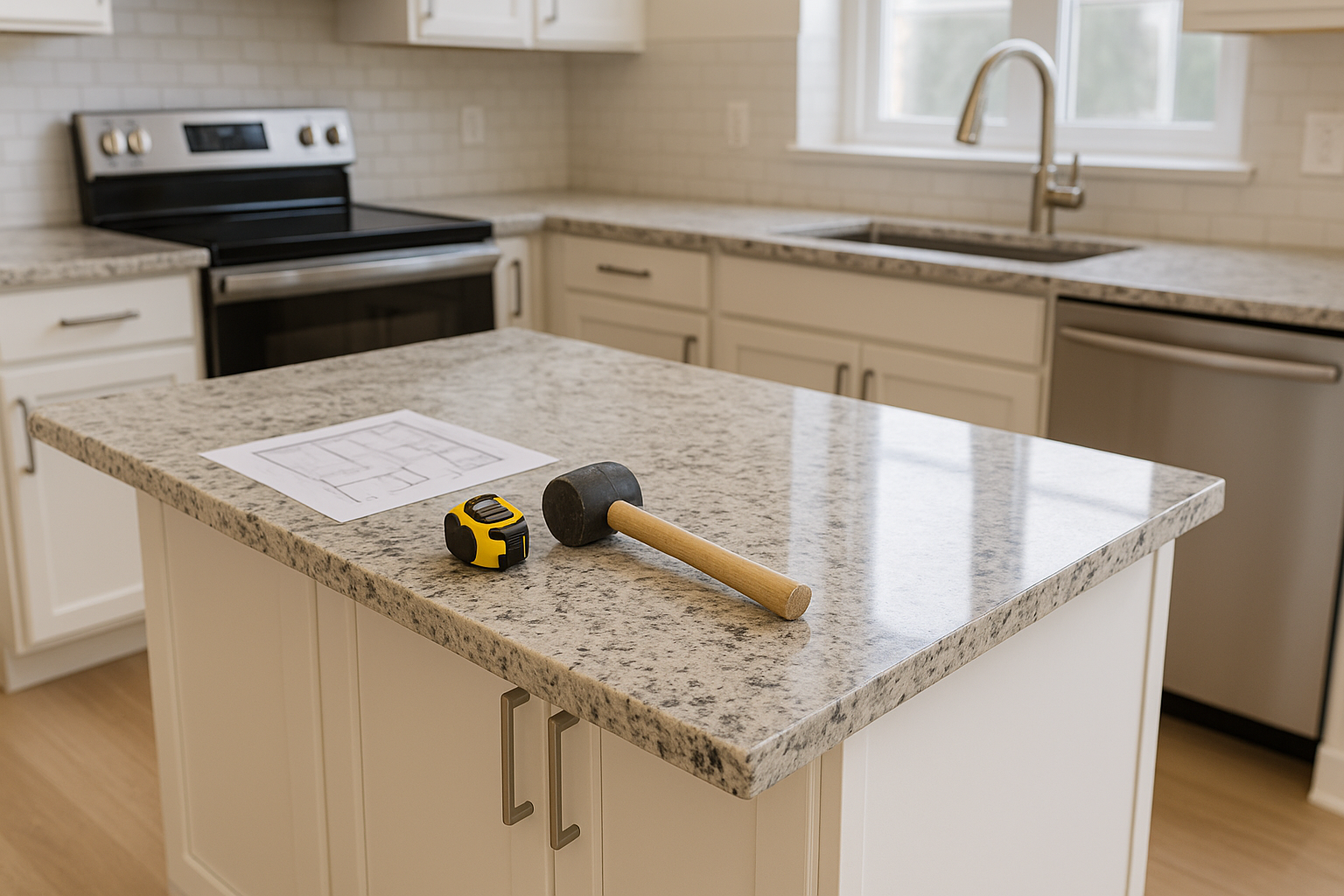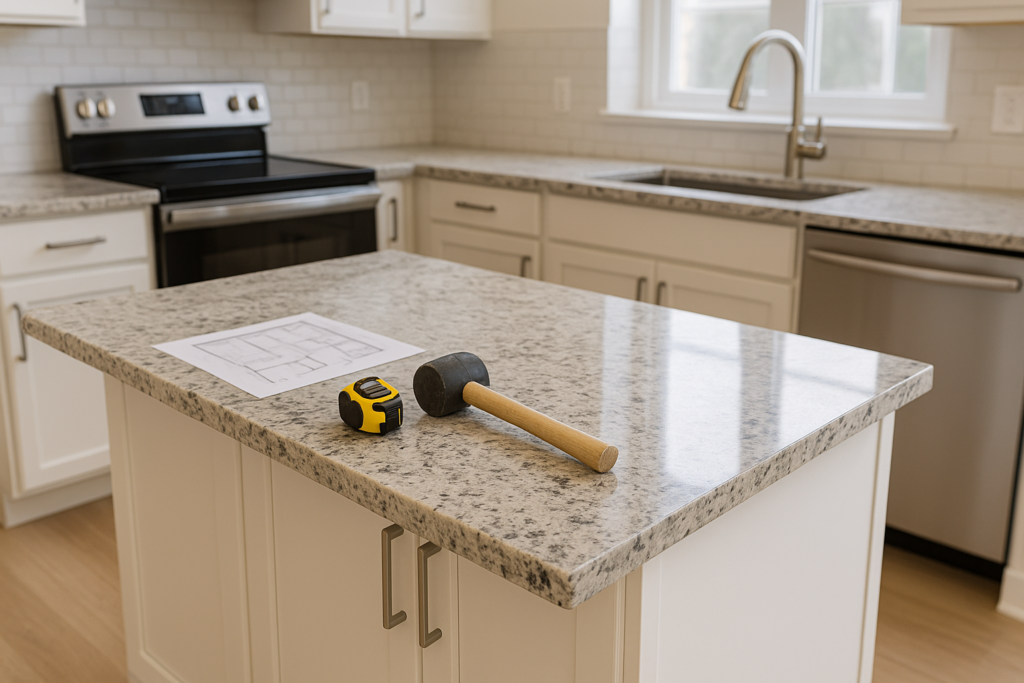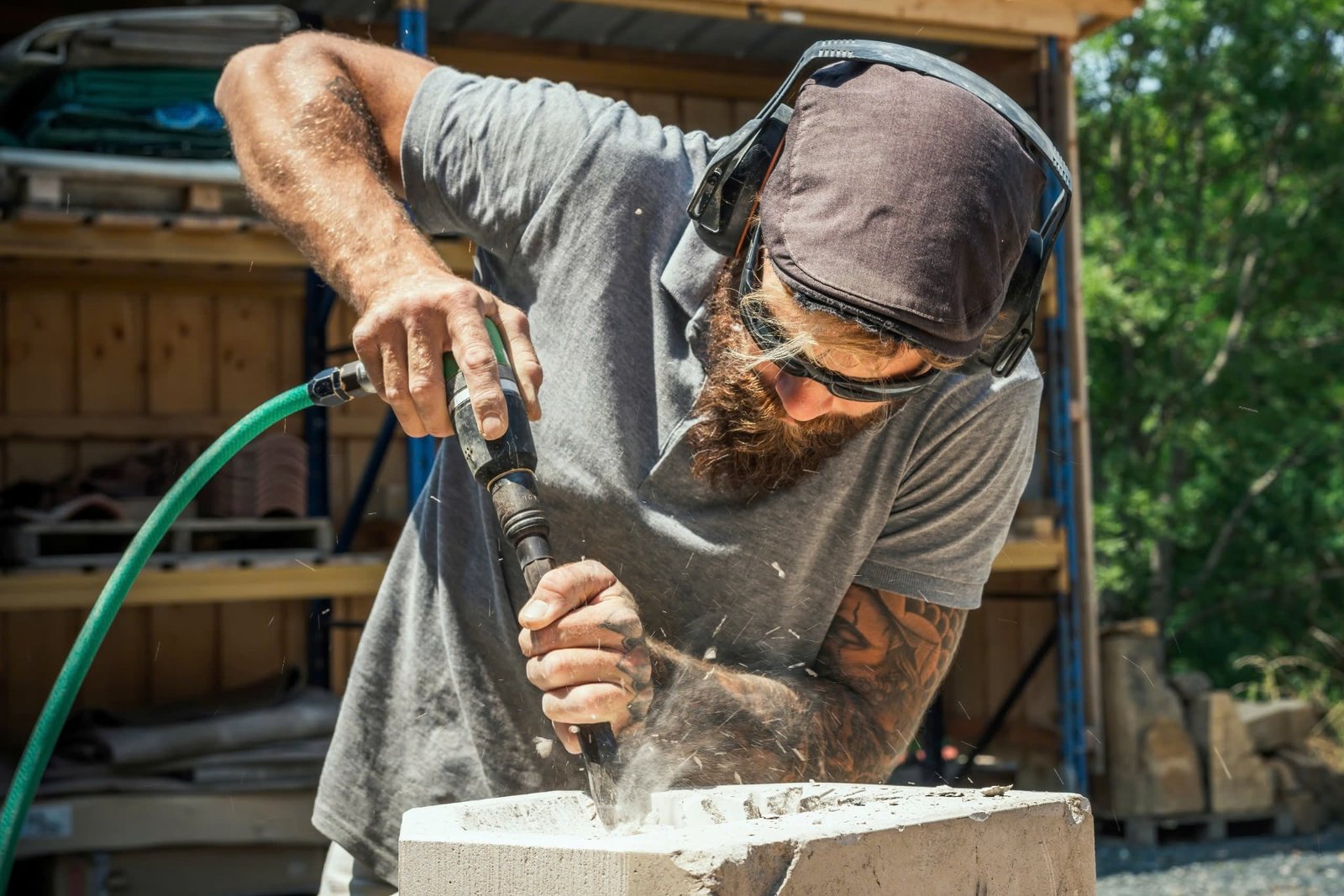
it’s time for a countertop replacement; this article will help you recognize the signs that you need a new countertop installation.
Kitchen countertops are essential to the functionality and visual appeal of any home. But even the most durable surfaces won’t last forever. Over time, wear and tear can degrade performance, appearance, and safety. If you’ve been wondering whether it’s time for a countertop replacement, this article will help you recognize the signs that you need a new countertop installation.
Whether you have granite countertops installed, a quartz countertop installation, or an older laminate surface, paying attention to the warning signs can prevent further damage, reduce costs, and ensure your kitchen continues to meet your lifestyle needs.

Why Knowing When to Replace Matters
Countertops face daily stress—from hot pans to knife marks, spills, and general aging. Overlooking the need for kitchen countertop installation can lead to:
- Structural issues in cabinets or appliances
- Mold or bacteria growth from cracked surfaces
- Lower property value and poor visual appeal
- Higher long-term countertop installation cost
Recognizing early indicators allows you to plan a seamless countertop replacement, minimize disruptions, and improve both functionality and aesthetics.
1. Cracks, Chips, or Deep Scratches
Visible damage is one of the most obvious signs that your countertop is due for replacement.
Key indicators:
- Deep gouges or cuts that collect bacteria
- Cracks that run through the slab or surface
- Sharp, uneven edges that pose safety risks
- Chipping around sinks or cooktops
While minor issues may be fixed with countertop repair, widespread damage often means it’s time for a full countertop installation.
2. Stains That Won’t Go Away
Stains from wine, coffee, oil, or acidic foods can embed into porous or worn surfaces. If your countertop has:
- Permanent discoloration
- Etched spots (especially on marble)
- Areas that darken with moisture
…you may benefit from countertop resurfacing, or in more severe cases, a full countertop replacement.
3. Water Damage or Mold
Water intrusion is especially problematic for wood or laminate countertops and often indicates compromised sealing.
Signs of moisture damage:
- Bubbling or swelling
- Black spots (possible mold)
- Soft areas that feel unstable
- Mildew smells near sinks or seams
Water damage is not only a hygiene concern—it also affects the structure and lifespan of the countertop.
4. Outdated Style or Material
Your kitchen might function well, but if the design no longer aligns with your taste or current trends, it could be time to refresh your look.
Design-related reasons to upgrade:
- Faded or outdated colors
- Edges or finishes no longer in style
- Mismatched surfaces after a kitchen renovation
- Resale goals requiring a modern update
Not sure what material to pick next? Read What Is the Most Durable Material for Countertop Installation? to make an informed decision.
5. Difficult Maintenance or Cleaning
If your current surface requires constant upkeep and still looks dull or stained, it might be more cost-effective to replace it.
Common issues:
- Requires sealing too frequently
- Shows streaks or spots even after cleaning
- Doesn’t retain shine despite polishing
To maintain a glossy finish on new surfaces, visit What Helps Maintain Shine After Countertop Installation?
6. Seams or Joints Separating
Countertops with visible seams can deteriorate over time due to movement, water infiltration, or improper kitchen countertop fitting.
Look for:
- Visible gaps between segments
- Caulk lines lifting or cracking
- Food and debris getting trapped between slabs
This may be repairable in early stages but often signals the need for new installation—especially for stone or engineered slabs.
7. Cabinets or Structure Below is Failing
Sometimes the issue isn’t the surface but what lies beneath it. If your countertop is sagging, uneven, or cracking without external impact, it could be due to failing cabinetry or poor original installation.
In these cases, a new countertop installation near me professional should assess whether structural upgrades are needed before proceeding.
8. You’re Remodeling Your Kitchen
If you’re updating flooring, cabinets, or layout, keeping old countertops may clash with your new design or compromise the overall transformation.
Benefits of replacing during a remodel:
- Seamless kitchen countertop fitting
- Integration of sinks, appliances, or backsplashes
- Consistent materials across all surfaces
- Increased home value
Many homeowners combine granite countertop installation or quartz countertop installation with full kitchen upgrades for a cohesive look.
9. You’ve Outgrown the Functionality
Your lifestyle may have changed since your last countertop installation. If your needs now include:
- A larger island
- Easier maintenance
- Smart kitchen integrations (charging ports, pop-up outlets)
- Kid- or pet-friendly surfaces
…then it’s time to rethink your countertop layout and material selection.
10. Repairs or Patching Aren’t Working Anymore
Frequent countertop repair—like filling cracks, replacing sections, or refinishing—can be a sign that your current surface is beyond its useful life.
If repairs are:
- Becoming more frequent
- More expensive than replacement
- Failing to restore appearance or function
…it’s likely time for a new countertop replacement.
What Are the Next Steps?
If you’re noticing any of the above issues:
- Get a professional assessment from a countertop installation near me provider
- Research materials that match your durability, maintenance, and design needs
- Set a budget for installation, materials, and any structural updates
- Schedule the installation at a time that minimizes kitchen disruption
Final Thoughts
A well-installed, modern countertop enhances the heart of your home—your kitchen. Ignoring the signs of aging, damage, or dysfunction can lead to higher countertop installation cost and inconvenience later.
If your surface is cracked, stained, outdated, or just no longer suits your needs, it’s time to explore new kitchen countertop installation options. From long-lasting quartz to elegant granite, replacing your countertop isn’t just a repair—it’s a transformation.

